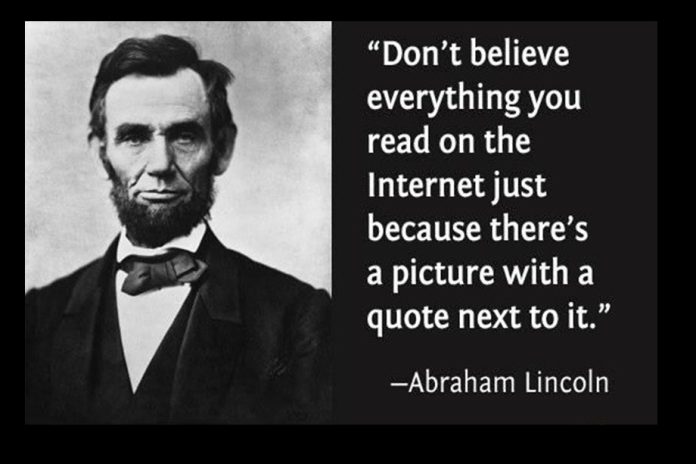Internet is a great source of information for youngsters and adults alike. There are always opportunities to research, learn new facts and skills, or even broaden perspectives is also an important part of learning. The Internet can also be used to build positive relationships with others, to play with, interact and share information with. Whatever one does while navigating through the internet, he or she is constantly making decisions on who or what to trust online. The amount of data that one consumes each day on the internet is 2.5 quintillion bytes. In case you don’t know, quintillion has 18 zeroes. That is a lot of information to be consumed every day. But how true is that information? Is there any assurance to that? Abraham Lincoln rightly said;
On a side note, if you are looking for an internet connection for simply browsing the web, or stream movies, or even play games, we recommend you to go for Xfinity. Whether a slow internet connection is all you can afford at the moment, or a faster one is what you need for your productivity, Xfinity internet plans have got multiple options for you.
Things to consider before believing something on the internet
In the early days of the internet, there were many talks and jokes about reading and believing everything on the internet. Somewhere along the way, this distrust of information got turned into a blind trust in anything and everything one sees online. How did we get to that point? Following are some of the things you must consider before accepting it as a fact outright.
- No quality assurance. there is no quality assurance about the information found on the internet. Anyone can post anything on the internet stating it as a fact without mentioning any source whatsoever.
- No fact-checking. the internet found on the internet hasn’t been checked for accuracy. No one is monitoring it and no one is double-checking it. Anyone could post a Tweet and their million followers would go berserk, believing they are right. For example, a small-town Mr. Tucker who had only 40 Twitter followers posted a tweet about paid protestors being accommodated to a demonstration against the then-President Donald J. Trump. This, in turn, fueled a nationwide conspiracy theory and garnered hundreds of retweets of the original tweet, leading everyone to believe it was true, and no one fact-checking it.
- Absence of non-biasness. Not all websites are the same; they all differ in quality, purpose, and bias. For instance, some websites have sponsors that pay them to publish specific content to promote their products or propaganda. And the websites would publish it without any hesitation.
- Outdated information. since no one is monitoring what anybody ever posts or publishes on the websites, some of them even post information that is outdated and not keeping up with the times. And anybody reading it is bound to believe it to be a recent issue.
- Not to be used in an academic context. that the quality of information that you find on the internet is not appropriate for an academic setting.
Advantages of the internet
While there are things to be skeptical about from the internet, there are also certain advantages to having information on the internet;
- There are powerful search engines that will provide many desired results to choose from
- Scholarly articles are published journals from reputed institutions, and the data shared by them on the internet have been manifested from multiple trials and errors. Hence, they can be trusted and are usually distributed and shared among the academic circles.
- There are message boards and forums on the internet where anybody can communicate on any topic. One also has the ability to get a wide range of opinions, and he can find people who share the same interests as him.
- One can also share and read news about current affairs and happenings around the world.
- One can also find lots of DIY and know-hows to follow, in the form of text and video guides. People have the ability to share their talents with the rest of the world, and also teach them how others can also feed and polish their own talents.
- The Internet allows email communication, through which people can stay connected to one another. Best of all, the email service is free for anyone to use.
Conclusion
While the fact that ‘’the truth is out there’’ is most certainly true, one should always be skeptical about what he finds on the internet. Internet is the firehouse of information that delivers to your virtual doorstep every moment. One should not believe every information he finds on the internet, rather he should develop an objective technique of fishing out resources that present both sides to the information, and be able to differentiate facts from fiction.


